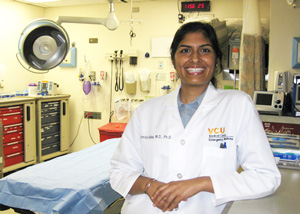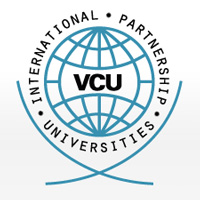
Back in the U.S., Sikka is now training in the Department of Emergency Medicine residency program.
When Veronica Sikka, M.D., returned from a month’s rotation in Chandigarh, India, she told me that she had a new appreciation for how the South Asian country had learned to practice very sophisticated medicine with minimal resources.
During the spring of her fourth year in medical school, Sikka traveled to the world’s second-most populous country under the auspices of VCU’s partnership with the Post Graduate Institute of Medical Education and Research. The Institute is located in Chandigarh, a northern city that boasts the highest per capita income in the country and some of the brightest clinical minds in India.
Nevertheless, Sikka found limited beds and staffing and strained financial resources at the Institute, which serves as the city’s Level I Trauma Center. In her experience however, those limitations did not translate into diminished health care quality.
Assigned to the emergency department, Sikka worked long hours, seeing patients and discussing their differential diagnoses and treatment plans with attending physicians. In the midst of her experience, she was reminded of a 2006 Institute of Medicine report that emphasized that U.S. emergency physicians work in a fragmented system of emergency care with limited interhospital and out-of-hospital care coordination, too few on-call specialists, minimal disaster readiness, strained inpatient resources and inadequate pediatric emergency services.
“If we could take the efficiency India has achieved with their access to modern technology but increased emphasis on basic clinical exam skills,” wrote Sikka, “and combine it with American’s current health care resources that are far more abundant than what is available in India, we have awesome potential to address many of the problems highlighted in the IOM’s recent report.”
She offers this as an example: “Rather than immediately resorting to imaging and labs, the physicians there are great clinicians first and foremost—using their clinical skills and acumen to guide patient management as opposed to a lab value or image. Sometimes we get so dependent on tests and imaging here that we forget that perhaps the best judge of a patient’s disposition is not necessarily a blood value or an x-ray but the clinician’s sixth sense of what he or she feels is going on with the patient.”

Our medical school established its partnership with the Institute in 2006 to foster just this kind of experience. Already yielding faculty collaboration in the fields of psychiatry, genetics and internal medicine, it is one of 15 partnerships that VCU has established with international universities and one of three international agreements forged by the medical school.
Psychiatry Professor Ananda Pandurangi, M.D., is director of our partnership with the Institute. He says that it’s a great learning place for our students and residents in various disciplines because of three unique qualities. “They are a top-ranked academic medical center in India, a tertiary care hospital with 64 different medical-surgical specialties and yet they also see a significant number of patients receiving care for the first time from two surrounding states.”
With a bachelor’s, two master’s, a Ph.D., and M.D. to her credit, Sikka’s connection to VCU now spans more than a decade and is ongoing. She is now training in the Department of Emergency Medicine residency program. “VCU is one of a kind in its strong commitment to ensuring students and residents are given access to ample opportunities that will enrich their education and training. I had many opportunities to transfer to other institutions throughout my educational and residency training, but VCU is difficult to match.”
She says that this experience was a wonderful opportunity to “gain a unique insight into how healthcare is delivered in countries that were once third world nations and today are on the cutting edge of medical technology. As we enter a historical era in our country where we are starting to question our healthcare system and determine what we can do to make it better, it is helpful to have an international perspective to inform our national debate.” Wanting to eventually pursue a career that combines both academic emergency medicine and health policy, Sikka believes global perspectives such as the one gained in India will position her well for the coming years.

Jerome F. Strauss, III, M.D., Ph.D.
Dean, VCU School of Medicine
Executive Vice President for Medical Affairs, VCU Health System

